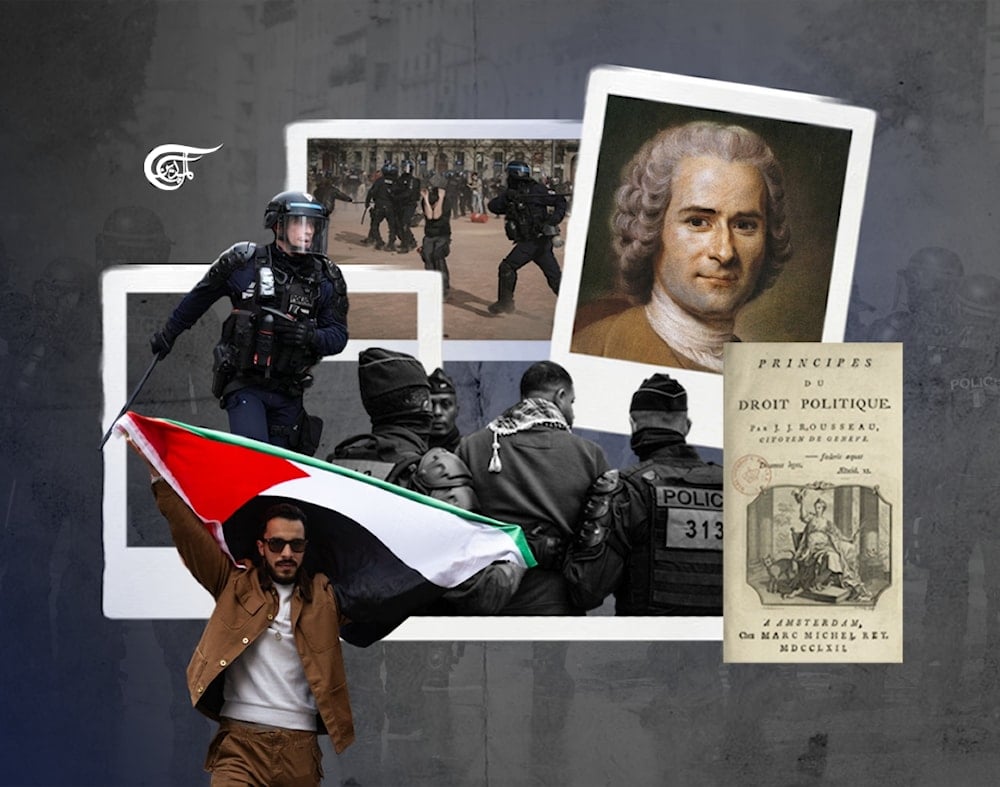Rousseau's general will theory and its abuse
The concept of the "rule of law" has been extensively misused, as numerous EU countries have apprehended individuals for expressing their opinions, thereby suppressing freedom of speech.
-

What Rousseau didn’t realize would happen was the fact that leaders would use the ambiguity of his concepts to back authoritarianism. (Al Mayadeen English; Illustrated by Batoul Chamas)
Rousseau advocated for direct democracy and the inherent liberty of people in their natural state, as reflected in the United Nations Charter, the Universal Declaration of Human Rights, and the European Union Charter. His ideas have influenced contemporary international relations, which has used them to implement long-awaited social changes, while also twisting some of his theories to excuse power abuse, authoritarianism, and suppression of freedom of expression. One may come to wonder what liberalism means or what Rousseau’s general will theory is used for.
Rousseau’s general will theory
Rousseau's social contract theory emphasizes the "general will" as an expression of freedom, aiming to establish principles that rational people would agree to under idealized conditions. In Du Contrat Social, Rousseau argues that individuals are born free and equal, with equal authority over themselves and others. The social contract tradition aims to make coercive power legitimate by determining moral principles that should underpin a state and designing one to meet those standards. Rousseau asserts that sovereignty cannot be transferred and that adopting a social pact based on collective lawmaking can prevent despotism.
Rousseau's conception of the general will is divided into two parts: the democratic conception, which believes citizens assemble in person to legislate, and the ultra-democratic conception, which views it as a transcendent fact. He rejects the idea of sovereignty being alienated, and emphasizes the importance of democratic mechanisms for law formation.
Rousseau and liberalism
Liberalism is a political ideology that emphasizes individual rights, asserting that a fair political system is established for the welfare of individuals. The objective is to restrict and scrutinize political authority, guaranteeing that a nation's actions in foreign territories do not have adverse effects on its own freedom. It places significant emphasis on militaristic foreign policies, which frequently entail the accumulation of military might to engage in conflicts with other nations, while simultaneously suppressing the rights and freedoms of its own populace. In order to tackle this issue, liberalism frequently imposes limitations on military power by establishing civilian authority over the military, thus fostering personal liberty and averting the subjugation of its populace. This approach is not restricted solely to domestic politics, but also encompasses international relations.
Jean-Jacques Rousseau, as part of his advocacy for liberal reform, highlighted the significance of social knowledge in the struggle between conservative and liberal ideologies. Rousseau advocated for the principles of moral autonomy, voluntary self-restraint, and a society based on social contracts. Additionally, he pointed out the paradoxical nature of egalitarianism, which assumes that social differentiation results from innate ability unless coercion prevents it.
General Will and vague ideals
The General Will theory conceptualized “democratic ideals” and called for establishing institutions that would make sure they were implemented. The theory did not define what those ideals are, so state institutions may give a “democratic image” to the laws implemented, while justifying authoritarian laws and law implementations as needed steps to “ensure the democratic ideals are respected” as many European states justify the crackdown of opposition or anti-establishment dissent. Historically speaking, one of the most interesting periods of Europe’s history was during the rise of Napoleon from an elected representative to an authoritarian “emperor”, having cleverly twisted the newly liberal democratic and republican ideals into new authoritarian ones after extensively studying Rousseau’s social contract and especially the general will as a baseline theory.
Assessing Liberalism in the current events
Europe credits itself as being the hub of liberalism in the world, celebrating the ideas of Rousseau and implementing “The General will” theory in their policies, expanding it within the EU members as well as partners. The Treaty of Lisbon has guaranteed the parity of all European Union member states, however, there exists a discrepancy between internal EU agreements and the realization of liberal principles.
The relationship between EU countries and NATO, or the North Atlantic Alliance (which is a military alliance), in itself, is contradictory to liberal ideals due to NATO's involvement in military actions against sovereign nations in the world, where liberalism has been used as a pretext for illegal bombings. Liberalism has the potential to be used as a tool to suppress dissidents and nations that hold different cultural values and do not align with its principles.
The concept of the "rule of law" has been extensively misused, as numerous EU countries have apprehended individuals for expressing their opinions, thereby suppressing freedom of speech. Countries such as France, Germany, and the Netherlands have used riot police against university students protesting for the end of the war on Gaza. These countries have justified the violent suppression of the marches and the student encampments under the pretext of students attacking the police, and of course, linking it to anti-Semitism even if a large part of the protesters are of Jewish descent themselves. The same countries who has been preaching about human rights and freedom of expression are violently attacking a portion of their society that doesn’t agree with their ideals, and it is weird that they are taking these steps to defend the interests of “a foreign entity”, which in itself is a first to happen at a large scale.
In other words
Rousseau, a celebrated enlightenment philosopher, sought to end the existence of authoritarian regimes by bringing the general will concept as a baseline for “democratic states” that protects the freedom of expression, as he was himself exiled for his new and strange theories in his time. What he didn’t realize would happen, was the fact that leaders would use the ambiguity of his concepts to back authoritarianism and use it to greenlight the violent suppression of dissents, or meddle with other countries’ internal affairs and cause “color revolutions”, regime changes, civil wars and so on because of not “upholding liberal ideals”. So at the end, what is liberalism really?

 Asmaa Rassy
Asmaa Rassy
 6 Min Read
6 Min Read








